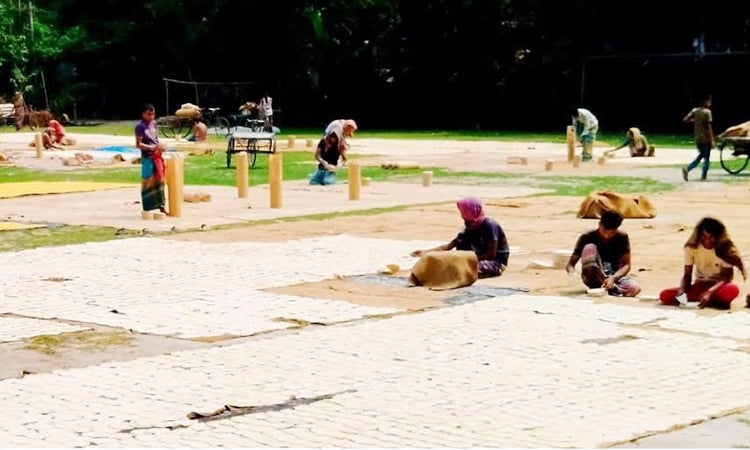News Flash
News Flash

By SM Zahid Hossain
KHULNA, April 30, 2025 (BSS) - Daxindihi village, located in Phultala upazila of Khulna district, has earned a reputation for producing raw papad over the past 70 years.
The tradition of papad-making in this village dates back over seven decades. Handmade papads from Daxindihi are sent to various districts, including Dhaka and Chattogram.
Daxindihi is about 40 kilometers from Khulna city and 7 to 8 kilometers from Phultala. The village is also home to the Rabindra Complex, the ancestral residence of poet Rabindranath Tagore's father-in-law.
The papad-making tradition began with Satish Chandra Dutta, a philanthropist and businessman who introduced the craft to the village. Over time, the skill spread across families, and now nearly every household contributes to the production process of the snack item.
During a recent visit, it was found that over 50 small and medium-sized factories are involved in papad production, with nearly every household participating directly or indirectly. Workers were seen drying papads on mats and plastic sheets in open fields under the hot sun.
Speaking to BSS, Ananda Dutta, grandson of Satish Chandra Dutta, said, "My grandfather started the papad business in this."
"My father, Sushil Dutta, later took over after my grandfather's death and expanded the business," he added.
"As my father is now old and ill, I am running the business. Currently, over 50 workers produce 200 to 250 kilograms of papad daily."
"I sell papads to wholesalers in various districts, including Khulna, Chattogram, and Dhaka divisions. I earn around Tk 25 to 30 lakh annually," he said.
The industry has created a sustainable livelihood for the villagers, especially women, who play a key role in the production process.
Samad Mia, a factory owner in the village, told BSS, "I couldn't support my family on daily wages, so I began making papads. Through hard work, I built my factory. Now, we produce around 600 kilograms (16 maunds) of raw papad daily."
Samiron Bewoa, 38, another factory owner, said, "My three children and I produce about 50 kilograms of raw papad daily, including masala papad. During school and college holidays, our output sometimes rises to 100-150 kilograms."
"I built my factory eight years ago after my husband's death. I struggled to support my three children and elderly mother-in-law, but now I run the factory with a monthly income of around Tk 45,000," she said with a smile.
Housewife Mahmuda Khatun explained the process: "We grind mung, mashkali, and khesari lentils, then mix the flour with water, salt, baking soda, and black cumin seeds to form a dough. Small balls are made, flattened into thin sheets, and dried in the sun for about one and a half hours. Once dry, they are packed and ready for sale."
Soleman Sheikh, a former daily wage earner, said, "It was difficult to make ends meet. I started by sourcing rice and lentils to make papads. Now I employ about 70 workers, producing around 26 maunds daily, with an annual turnover of Tk 20-25 lakh."
Taslima Begum, a part-time papad maker, said, "I roll about 1,000 papads in three hours for Tk 75. Most women in the village contribute this way."
Like Samad, Samiron, Mahmuda, Soleman, and Taslima, many villagers now sustain their families through papad-making.
When contacted, Phultala Upazila UNO Tasnim Zahan said the papad industry has made a significant contribution to Daxindihi's local economy. With its rising demand across the country, it has empowered the village and created opportunities for many families.
As the industry continues to flourish, it is expected to play an even greater role in the region's economic development, she added.